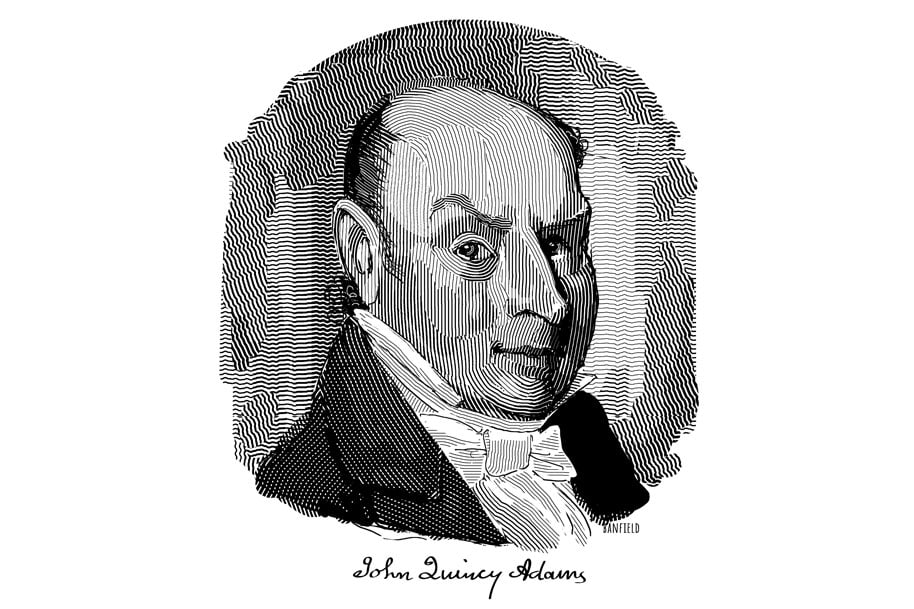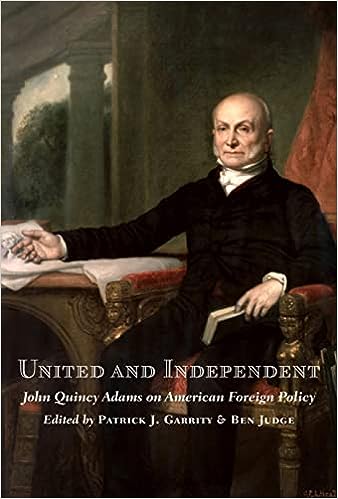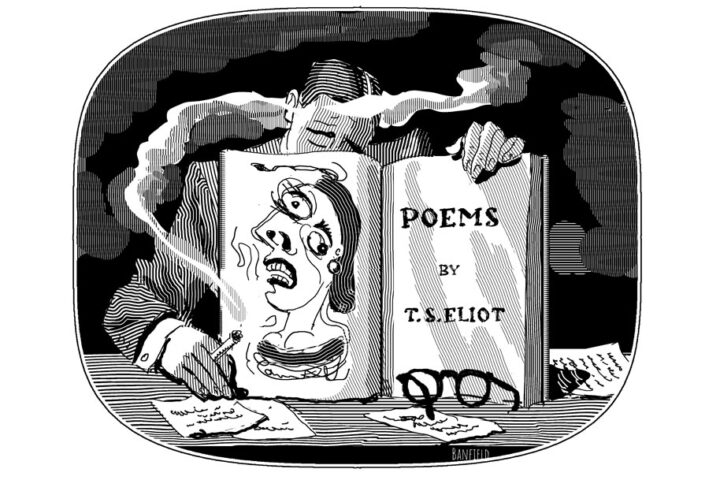Books Reviewed
The United States has had perhaps no greater master of grand strategy than John Quincy Adams. Yet Adams’s life and works are understudied. A little over a quarter century ago, the movie Amistad highlighted the latter part of his public life—as America’s “Old Man Eloquent” who fought against the “gag rule,” which blocked discussion of slavery in the House of Representatives, and who, as in the movie, worked to secure liberty for slaves illegally transported on the high seas. But the first part of Adams’s career—from his boyhood journey to Europe alongside his father in 1778, to his brilliant tenure as secretary of state under President James Monroe—was no less illustrious. As its title suggests, United and Independent: John Quincy Adams on American Foreign Policy provides an introduction to this first act of Adams’s story.
United and Independent is artfully crafted. It presents a biographical sketch of Adams’s life from his birth in July 1767 to the end of his presidency in March 1829. The account is divided into ten chapters, each of which is followed by a selection of documents from the relevant portion of Adams’s life, with introductory paragraphs highlighting key passages. The sources include diplomatic communiqués, letters, speeches, and diary entries (Adams was among the great diarists of his age). This is a life-and-letters introduction to Adams’s diplomacy.
***
The editors are eminently qualified for the task. Patrick J. Garrity, who died at age 65 in 2021, spent his busy career studying American foreign policy, from George Washington’s Farewell Address and the annexation of Hawaii to modern nuclear weapons policy. Many of his essays appeared in CRB. Years ago, he showed me selections from his excellent biography (still unpublished) of John Quincy Adams, a multi-volume study of the kind that has fallen out of favor in recent years. Ben Judge, like Garrity, is a Claremont Graduate University Ph.D. with a keen interest in American foreign policy. He wrote his dissertation on William Howard Taft as governor general of the Philippines. Judge is perfectly equipped to bring this part of Garrity’s life’s work posthumously to the public.
Reading through the remarkable writings collected in this volume is an education in American foreign policy during the first 50 years of the Union’s existence, and thereafter. Adams had a profound ability to connect the strategic interests of the United States with a clear-eyed assessment of relations among both major and minor powers. In his dispatches from Europe he showed an ability, perhaps unsurpassed among Americans of his day, to judge the interests of other nations and the likely direction of their policy choices. He was able to anticipate and react in support of American interests, insofar as possible.
***
George Washington, an early patron, saw almost limitless promise in young John Quincy: “I shall be much mistaken,” Washington wrote to John Adams of his son, “if, in as short a period as can well be expected, he is not found at the head of the Diplomatique Corps; let the government be administered by whomsoever the people may chuse.” This prediction came true when, after years of experience overseas with a brief stop to serve as a senator from Massachusetts, Adams took the helm of American foreign policy as secretary of state to President James Monroe. There he played the diplomatic game with masterly skill, most notably in the Adams-Onís or “Transcontinental” Treaty of 1819, between the U.S. and Spain. That treaty added Florida to the Union and extended America’s border along the 42nd parallel all the way to the Pacific Ocean, securing the Union’s status as a continental power.
The book’s title highlights two main themes of Adams’s policy: that the United States shall remain united, and that it shall remain independent. It could even be said that the states should remain united in order to be independent. In an 1801 letter, Adams, then finishing up his tenure in Berlin as America’s minister to Prussia, wrote to his brother, Thomas Boylston Adams, that “I look to the Union of our country as to the sheet anchor of our hopes, and to its dissolution as to the most dreadful of our dangers.” As he reasoned, “if once we divide, our exposure to foreign assault will at once be multiplied in proportion to the number of states into which we shall split.”
The evidence of this was to be found all across the Old World: “Europe being divided into a number of wholly independent states,” wrote Adams, “it is by their armies alone that they can defend themselves against the encroachments of each other.” In other words, a failure of union in North America would bring regular, recurrent war, with all its horrors, as well as the illiberal and inegalitarian governance that was war’s handmaid. Disunion meant the return of a king.
This primary commitment to union explains some of Adams’s prudential choices. Senator Adams had no particular love for the embargo that Thomas Jefferson and James Madison engineered to cut off all trade with Europe, instead of fighting off French and British attacks on American independence during the Napoleonic wars. But Adams also realized that, since the republic lacked a navy or army of any size, armed neutrality was not an option. A strong faction in New England was moving toward disunion under the catastrophic misapprehension that the northeastern states could go it alone. Under those circumstances, Adams saw, the least bad choice was to stick together and present a united front behind the embargo.
As tensions mounted between the states, Adams remained firm in his conviction that practically no imagined benefit would be worth the terrible cost of disunity. During the Missouri Crisis, Secretary of State Adams and Secretary of War John C. Calhoun discussed the possibility of a split between North and South. In his diary, Adams recorded part of his discussion with Calhoun:
He said he did not think it would produce a dissolution of the Union, but, if it should, the South would be from necessity compelled to form an alliance, offensive and defensive, with Great Britain.
I said that would be returning to the colonial state.
He said, yes, pretty much, but it would be forced upon them.
In other words, disunion would point back toward the past: either the dependent colonial past, or a Roman republican model, with citizens lording over slaves and war as a constant. Neither arrangement would fulfill the promise of a large, free, egalitarian, commercial republic.
***
United and Independent begins with a short foreword by Matthew Spalding, dean of Hillsdale’s Van Andel School of Government in Washington, D.C. Spalding’s essay is dated, significantly, July 4, 2021—the bicentennial of what is probably Adams’s best-known speech. As the editors note, Adams delivered the speech wearing the formal academic robes he had donned as Harvard’s first Boylston Professor of Rhetoric. Bearing with him an original copy of the Declaration of Independence, looking every bit the part of the “citizen speaker,” Adams declared:
Wherever the standard of freedom and independence has been or shall be unfurled, there will [America’s] heart, her benedictions and her prayers be. But she goes not abroad in search of monsters to destroy. She is the well-wisher to the freedom and independence of all. She is the champion and vindicator only of her own…. She well knows that by once enlisting under other banners than her own, were they even banners of foreign independence, she would involve herself, beyond the power of extrication, in all the wars of interest and intrigue, of individual avarice, envy, and ambition, which assume the colors and usurp the standard of freedom.
In seeking out monsters, argued Adams, America would ensnare herself in the obligations and the bloody logic of the fractious European monarchies. As a result, “the fundamental maxims of her policy would insensibly change from liberty to force.”
It is not as if the U.S. would never have a strategic interest in supporting the independence of other nations, or even of empires and unions of nations. The effort to defend a sovereign United States will always involve some foreign entanglements. The challenge, therefore, is to keep American independence in sight as the governing aim of all international obligations.
As Spalding notes, these nuances are lost in the widespread but oversimplified division between “idealism” and “realism” in foreign policy. The dichotomy mistakenly implies that to acknowledge reality is to forsake one’s ideals. But these categories are not really mutually exclusive, as Adams demonstrates: he was a supremely realistic thinker, but he grounded his analysis upon the principles and logic of the Declaration. It is not a coincidence that the Declaration was at the heart of Adams’s famous 1821 oration. He literally read the Declaration in the middle of the speech. His response to challenges in foreign affairs always remained grounded in truths about the nature of man articulated in America’s founding documents.
As Adams knew, it remains true everywhere and always that men are created equal, endowed by their Creator with certain inalienable rights. Human nature being what history demonstrates it to be, however, temporal threats to those transcendent rights abound on every side. It follows that statesmen must take realistic steps to secure the independence and longevity of a union that can defend those rights. There are certain things one must do; there are some things one must not do; and there are many things one must sometimes do, that one would wish one did not have to do, to defend such a republic. A great diplomat, in other words, must have a bit of a tragic sensibility alongside his love for his country. And amid all this, if he’s an American diplomat, he must maintain his devotion to the truths of 1776.
That devotion could hardly square with what is popularly known as “isolationism.” America does not go out searching for monsters if an event abroad poses no particular threat to affairs at home. But, as the editors note, “John Quincy also did not assume that monsters should be given an entirely free hand or that America must sit passively by.” In Adams’s day, during his tenure as secretary of state and president, this meant the U.S. had an interest in working with the newly post-colonial states of South and Central America. To be sure, Adams was skeptical that nations with little or no experience of elected government (among other difficulties) would produce regimes and leadership classes radically different from those of their former masters. But as the prime mover behind the Monroe Doctrine (which is included in this volume), Adams knew that America had a strong interest in the peace, security, and independence of all nations in the Western Hemisphere. Sitting idly by while European nations set out to recapture former colonies would be unlikely to help secure the independence of the Union.
***
In a message to Congress on March 15, 1826 (not included in this volume, but quoted, in part, in an editorial note), President John Quincy Adams reflected on the relationship between his South and Central American policies and the famous admonition against foreign attachments in Washington’s Farewell Address. Washington’s own thinking, as Yale University historian Samuel Flagg Bemis once noted, had been closely informed by young Adams’s own brilliant diplomatic dispatches. Yet the same prudence that counseled non-intervention in Washington’s day might require modest foreign involvement 50 years later. Adams noted: “The counsel of Washington…like all the counsels of wisdom, was rounded upon the circumstances in which our country and the world around us were situated at the time when it was given.” Yet even then it was clear that “the period was not far distant when we might defy material injury from external annoyance, when we might take such an attitude as would cause our neutrality to be respected, and, with reference to belligerent nations, might choose peace or war, as our interests, guided by justice, should counsel.”
For Adams, the goal of American foreign policy was to secure the independence of America and the union of the states, in whatever manner best served the principles that had justified the creation of the nation in the first place. Whenever and however a statesman acts, he must be guided by the truths on which our republic is built. In Adams’s day that meant trying to stay out of Europe’s quarrels. In the Americas, however, involvement was often necessary. To discern what prudence suggests requires experience in American and world politics, held alongside a deep familiarity with the truths upon which our union and independence rest. Americans could do worse than turn to this volume as we ponder how to sustain the republic, at home and abroad, in these fraught times.





